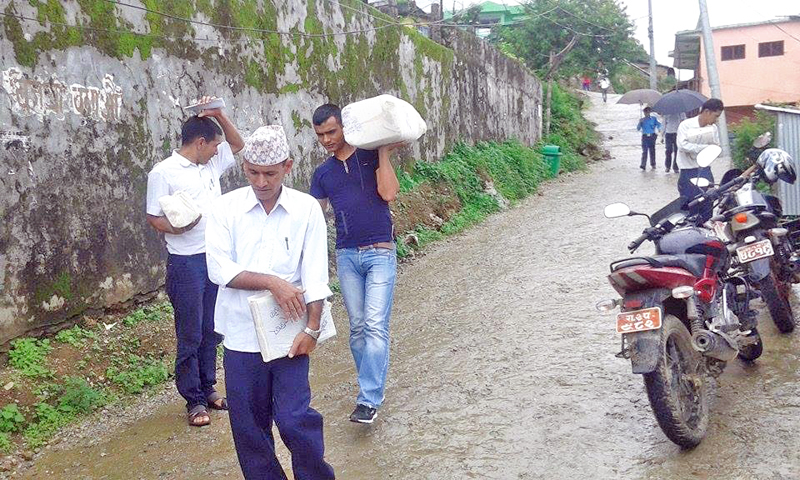TRC draws flak for delegating work to CDOs
Kathmandu, July 18
Conflict victims have taken serious exception to the Truth and Reconciliation Commission’s decision to allowing Chief District Officers to collect complaints from cconflict victims.
By ignoring its own stand; the TRC on Friday had giving responsibility of complaint collection to the CDOs for two days — on July 16 and 17.
Earlier, TRC had denied it shared any details of complaints lodged by victims of the decade-long Maoist insurgency with the CDOs as well as security bodies such as the Nepali Army, Nepal Police and Armed Police Force.
The CDOs were provisionally given such arole after the Local Peace Committees — which had been given the mandate to collect war-era cases on behalf of the TRC since mid-April — fell vacant following the expiry of service-contract of LPC staffers on July 15.
“The act of collecting complaints through CDOs is against the spirit of the TRC,” said Suman Adhikari, chairman of Conflict Victims Common Platform.
He said vacant positions at the LPCs should be filled on time, instead of haphazardly assigning the duty to CDOs, who could share such ‘sensitive information’ with security forces and ministers.
The Ministry of Peace and Reconstruction had hired LPC staffers on a one-year contract. Each LPC was manned by a secretary, a computer operator and an office assistant.
TRC Chairman Surya Kiran Gurung told The Himalayan Times that the body had no option but to give responsibility to the CDOs after positions at the LPCs fell vacant. He further complained that the government didn’t listen to his repeated requests to extend the contract of LPC staffers or hire new ones, in advance.
Gurung downplayed the chances of misuse of sensitive information as, according to him, “the victims were asked to lodge their cases inside sealed envelopes”.
TRC member Madhabi Bhatta, who had initially held views against the idea of mandating CDOs to receive complaints told The Himalayan Times, that the CDOs were not initially instructed to receive only sealed-complaints, but all the complaints. The CDOs were also given authority to have full access to the entire registration files of the complainants that so far was maintained by the LPCs.
A source said that CDOs in many districts have seized the registration files and instructed that the LPC offices be sealed, in case of refusal.
In some districts, conflict victims didn’t submit their complaints to the CDOs, casting doubt on the safety of the sensitive information — like the identity of the alleged perpetrators, witnesses, case details etc. At least 44 victims refrained from lodging their cases in Rukum district because they doubted that their information would not be kept confidential, a TRC source added.
“Who will be responsible if my complaint is leaked?” a conflict victim from Baitadi district asked THT over phone. The victim demanded extension of time for submitting complaints.
Gurung said though the extension of complaint submission was possible, the TRC would decide on it once LPCs get the required staffers.
The TRC had started taking complaints from the victims from April 17. Though a final tally is yet to come, the body has received some 55,000 complaints of rights violation cases that occurred during the Maoist insurgency.
Meanwhile, the local peace committee of Rukum also handed all the complaints to the District Administration Office yesterday.
Though the peace committee’s act has raised doubts, the committee has urged all the concerned not to doubt its motive. “As the complaints are sealed and have been sent along with a report as per the direction of transitional bodies, nobody should doubt the process,” said Raju Lamichhane, office secretary at the peace committee.
On his part, Rukum Chief District Officer Banshi Kumar Sharma informed about his office’s preparations to send the complaints to the transitional justice bodies in the Capital.
“As the collected complaints are sensitive, we are thinking of sending them with someone from the administration, rather than sending them via post or courier,” Sharma said, adding that the DAOs were liable to send the collected complaints to the higher transitional bodies from across the country.
Rukum, the cradle of the Maoist insurgency, has failed to receive complaints as expected, which stakeholders attribute to the conflict victims’ lack of trust in the government.
As per committee sources, as many as 2,500 and 57 complaints have been filed from the district with the Truth and Reconciliation Committee and the Commission for the Investigation of Enforced Disappeared Persons, respectively within the given time.
“As the government is normally passive in implementing things, the same might have dissuaded many locals from filing complaints,” said coordinator of peace committee, Khadga Bahadur Dangi.
962 complaints filed
CHITWAN: As many as 962 complaints related to conflict era incidents were filed with transitional bodies in Chitwan.
According to Local Peace Committee Chitwan Office Secretary Laxmi Gautam, 850 complaints and 55 complaints have been filed with Truth and Reconciliation Commission and Commission for the Investigation of Enforced Disappeared Persons respectively.
“Besides the complaints, there are 57 other complaints filed by victims of the Bandarmudhe incident,” she said, adding that the number of complaints filed make up 75 per cent of the total number of complaint forms distributed.
According to data, 338 persons died in the decade-long insurgency in the district and 168 others were injured or handicapped.
Similarly, while 92 persons were kidnapped, 50 were displaced, and 38 others disappeared.






